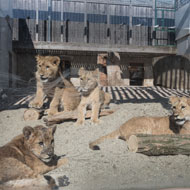
Charity rescues four cubs kept as pets in France
International wildlife charity Born Free is set to embark on its biggest relocation of rescued lions in 35 years.
The charity plans to relocate four lions cubs from captivity in France and transfer them to a sanctuary in South Africa.
The cubs, Horus, Kuuma, Dadou and ‘Girl’ (yet to be named), are just a few months old and were taken from their mothers before they were weaned. They have since been kept as pets in different locations in France, suffering terrible living conditions and battling illness.
Born Free says that it does not know how the cubs ended up as pets but it is thought that they may have come from travelling circuses.
Thanks to the French authorities and Born Free, the cubs have been transferred to a safe location near Lyon and now await transfer to Born Free’s Shamwari Private Game Reserve in South Africa.
Born Free’s head of animal welfare Chris Draper, who is overseeing the relocation, said: “The tragic stories of these cubs are the direct result from the appalling and continued demand for wild animals as ‘pets’ and in circuses.
“These four cubs face a happier future in our care, but we must also work to stamp out the trade in wild animals as pets and bring to an end the use of wild animals in circuses once and for all.”
To help make the mission a success, Born Free is asking from donations from the public. The total cost of relocating the cubs could reach £60,000 while the cost of looking after each cub, per year, could be as much as £9,000.
For more information about the mission or to make a donation visit www.bornfree.org.uk or text LIONS to 70755 to give £10.00
Image (C) Born Free/George Logan.



 The latest
The latest